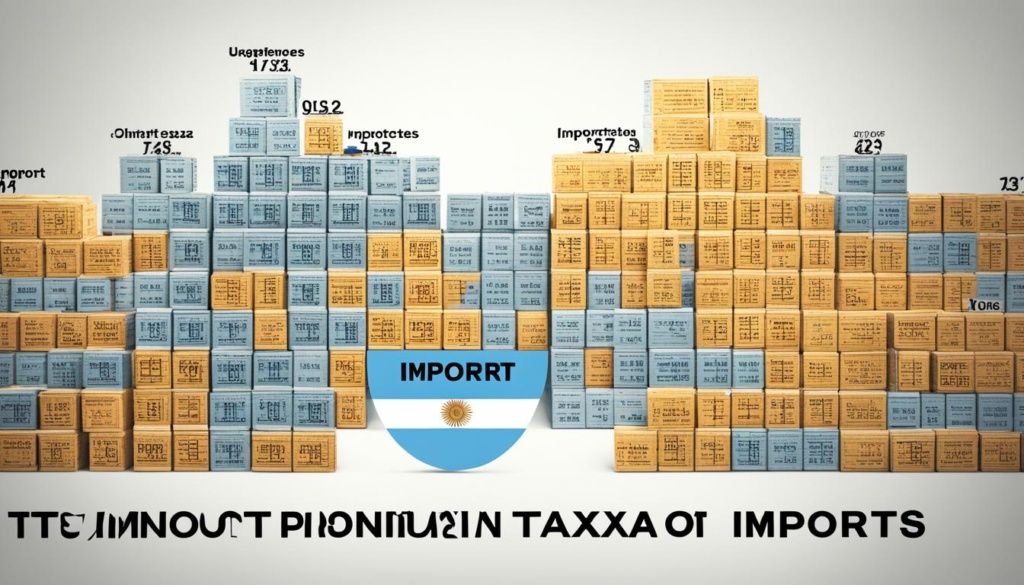When it comes to navigating the complexities of tax regulations, understanding Argentina tax laws is essential. The tax code in Argentina is governed by a comprehensive set of legislation that outlines the tax requirements for individuals and entities operating within the country.
For individuals who are residents in Argentina, they are subject to taxation on their worldwide income. However, they may be eligible for a foreign tax credit for taxes paid on income earned from foreign sources. Non-residents and foreign beneficiaries, on the other hand, are only taxed on their Argentine-source income.
Argentina imposes progressive income tax rates on both residents and non-residents, ranging from 5% to 35%. The tax year in Argentina corresponds to the fiscal year, which can either be the calendar year or a different 12-month period.
To navigate the intricacies of Argentina tax laws, it is crucial to have a thorough understanding of the tax system in Argentina, including the tax code and relevant legislation. By staying informed and compliant with the tax regulations in Argentina, individuals and businesses can ensure that they meet their tax requirements and optimize their tax planning strategies.
Personal Income Tax Rates in Argentina
Understanding the personal income tax rates in Argentina is essential for individuals looking to navigate the country’s tax system effectively. Personal income tax (PIT) rates in Argentina are progressive, meaning they vary depending on income brackets. As of January 1, 2023, the current PIT rates range from 0% to 35%, with different tax rates applied to each income bracket. The tax rates gradually increase as the income level rises, ensuring that higher earners contribute a larger portion of their income towards taxes.
Here is an overview of the current personal income tax rates in Argentina:
| Income Bracket | Tax Rate |
|---|---|
| Up to ARS 72,000 | 0% |
| ARS 72,001 – ARS 144,000 | 9% |
| ARS 144,001 – ARS 216,000 | 14% |
| ARS 216,001 – ARS 360,000 | 19% |
| ARS 360,001 – ARS 576,000 | 23% |
| ARS 576,001 – ARS 1,440,000 | 27% |
| ARS 1,440,001 – ARS 2,880,000 | 31% |
| Above ARS 2,880,000 | 35% |
It is worth noting that these rates are subject to change as tax regulations and legislation may be updated periodically. Individuals should consult with a tax professional or refer to the official sources for the most up-to-date information on personal income tax rates in Argentina.
Gross Income Tax in Argentina
Gross income tax in Argentina is a provincial tax that applies to self-employed individuals based on their gross earnings. This tax is an important component of the overall tax system in Argentina and contributes to the funding of provincial governments.
The average tax rate for gross income tax is 4% in the Federal Capital, also known as the City of Buenos Aires. Similar rates are applicable in different provinces throughout the country.
It’s important to note that professionals who do not operate their businesses in the form of a company are exempt from paying the gross income tax in the City of Buenos Aires.
Understanding the provincial gross income tax is crucial for self-employed individuals to ensure compliance with tax regulations and fulfill their tax obligations in Argentina.
The Importance of Gross Income Tax
The gross income tax plays a significant role in the revenue generation for provincial governments in Argentina. It contributes to funding important public services and infrastructure development at the local level.
“The provincial gross income tax supports the provision of essential services and enables regional governments to invest in the well-being of their constituents.”
Calculating Gross Income Tax
The calculation of gross income tax in Argentina is based on the individual’s gross earnings. Self-employed individuals should ensure accurate record-keeping and documentation of their revenues to determine the correct amount of tax liability.
It’s recommended to consult with a qualified tax professional or accountant who can provide guidance and assistance in calculating and filing the gross income tax returns.
Gross Income Tax Rates in Different Provinces
While the average tax rate for the gross income tax is 4% in the City of Buenos Aires, it’s essential to note that tax rates may vary in different provinces.
| Province | Tax Rate |
|---|---|
| Province A | 3% |
| Province B | 4.5% |
| Province C | 3.25% |
The above table provides an example of the variation in tax rates across different provinces. Self-employed individuals should be aware of the specific rates applicable in their respective provinces to ensure accurate tax compliance.
By understanding the gross income tax obligations and rates, self-employed individuals in Argentina can effectively manage their tax liabilities and contribute to the development of their local communities.
Foreign Beneficiary Tax in Argentina
Foreign beneficiaries working temporarily in Argentina for no more than six months during the year, who earn income through either the visual or performing arts or other profession, are subject to income tax on these earnings at the rate of 24.5% (35% on assumed profit of 70% of gross income) to be withheld by the local payer. Other tax rates could apply depending on the type of income to be paid.
Applicable Tax Rates for Foreign Beneficiaries in Argentina
| Type of Income | Tax Rate |
|---|---|
| Income from visual or performing arts | 24.5% |
| Income from other professions | 35% (assumed profit of 70% of gross income) |
Foreign beneficiaries in Argentina need to be aware of their tax obligations and ensure proper compliance with local tax regulations. The income tax on foreign earnings must be withheld and paid by the local payer, in accordance with Argentine tax laws.
“Foreign beneficiaries should consult with tax professionals or seek advice from the relevant authorities to understand their tax obligations and ensure compliance with Argentine tax laws.”
Failure to comply with foreign beneficiary tax requirements could result in penalties and legal consequences. It is important for foreign beneficiaries to keep accurate records of their income and expenses related to their activities in Argentina, as these records may be required for tax purposes.
| Key Points on Foreign Beneficiary Tax in Argentina |
|---|
| Foreign beneficiaries working temporarily in Argentina for no more than six months are subject to income tax on their earnings. |
| The tax rate for income earned through visual or performing arts is 24.5%. |
| Income earned from other professions is taxed at a rate of 35% (assumed profit of 70% of gross income). |
| Proper compliance with tax regulations is essential to avoid penalties and legal consequences. |
Taxation Levels in Argentina
Taxes in Argentina are levied on three levels: federal, provincial, and municipal. The main sources of state budget revenues in Argentina are income tax, value-added tax (VAT), and internal taxes. Each level of government has its own set of taxes and tax rates.
The federal government primarily collects taxes on income, profit, and capital gains. This includes personal income tax, corporate income tax, and taxes on capital gains from the sale of assets such as stocks and real estate.
Provinces in Argentina also have the power to impose their own taxes. These provincial taxes can vary but often include taxes on gross income, real estate, and vehicle fleets. The rates and specific taxes can differ between provinces, resulting in a complex tax landscape.
Municipalities in Argentina also have their own taxes that they collect from residents and businesses within their jurisdiction. These municipal taxes can include property taxes, business license fees, and taxes on specific activities or services provided within the municipality.
Overall, the taxation levels in Argentina can be challenging to navigate due to the variations in tax rates and regulations between the federal, provincial, and municipal levels of government.
Taxation Levels in Argentina Summary:
- Taxes in Argentina are levied on three levels: federal, provincial, and municipal.
- The federal government primarily collects taxes on income, profit, and capital gains.
- Provinces in Argentina can impose their own taxes, including taxes on gross income, real estate, and vehicle fleets.
- Municipalities in Argentina have their own taxes, such as property taxes and business license fees.
- The taxation levels in Argentina can be complex due to variations in tax rates and regulations.
Taxation of Imports and Exports in Argentina
Argentina applies taxes on both imports and exports, which have an impact on businesses and trade activities. It is essential to understand the regulations and rates associated with import tax Argentina, export tax Argentina, and customs tax Argentina to ensure compliance and make informed financial decisions.

Import Duties
Import duties in Argentina vary based on the type of goods being imported. The rates can range from 0% to 35% depending on the classification of the products. Importers must consider these duties as part of their cost calculations when importing goods into Argentina.
Export Duties
Similarly, export duties apply to goods leaving Argentina for international markets. These duties can range from 5% to 20% depending on the nature of the exported products. Exporters should factor in these duties when determining pricing and profitability.
Statistical Rate
In addition to import and export duties, there is a statistical rate that applies to all import operations in Argentina. Currently set at 2.5%, this rate is designed to gather data for statistical purposes. Importers need to account for this additional cost when importing goods.
Exemptions and Special Cases
Sometimes, specific imports may be exempted from import duties. For example, capital goods used for investment in hydrocarbon production developments might qualify for exemption. It is important to consult the relevant regulations and seek professional advice to determine eligibility for any exemptions and special cases.
It is worth noting that the import duty rates can be subject to change as per the government’s policies and economic conditions. Businesses engaged in import and export activities should stay updated on any revisions to import and export tax rates.
Value Added Tax (VAT) in Argentina
In Argentina, the Value Added Tax (VAT) is an important component of the tax system. Understanding the VAT rates and exemptions is essential for businesses operating in the country.
VAT Rates in Argentina
The current general VAT rate in Argentina is 21%. However, it’s worth noting that certain goods and services are subject to reduced rates. These reduced rates include:
- 10.5% for specific goods and services such as food products, books, and certain healthcare services.
- 27% for luxury items and specific services such as air travel and entertainment.
It’s important for businesses to accurately assess the applicable VAT rate based on the nature of their products or services.
VAT Exemptions
While most goods and services are subject to VAT in Argentina, there are also exemptions in place. One notable exemption is for export of goods and services. Exports are considered zero-rated, meaning no VAT is charged on the transaction.
Furthermore, VAT paid on imports can be credited against output VAT or refunded, depending on the circumstances. This mechanism helps to avoid double taxation and ensures fairness in international trade.
Special VAT Treatment for Digital Transactions
In today’s digital era, special tax treatment is provided for digital transactions originating from abroad. This treatment is subject to certain conditions and aims to address the unique challenges and complexities associated with cross-border digital commerce.
Businesses engaged in digital transactions should familiarize themselves with the specific requirements and obligations to ensure compliance with Argentina’s VAT regulations.
Wealth Tax and Excise Taxes in Argentina
Argentina imposes a wealth tax on shares issued by Argentine companies and owned by individuals or companies residing abroad. The tax rate ranges from 0.25% to 0.50% based on the value of the shares. This wealth tax, also known as the personal assets tax, aims to promote progressive taxation and ensure a fair distribution of wealth within the country.
In addition to the wealth tax, Argentina also levies excise taxes on various goods. These taxes are applied to a wide range of items, including automotive and diesel motors, tobacco, alcoholic beverages, luxury goods, and non-alcoholic beverages with caffeine and taurine. Each item has its own specific tax rate, determined by the government.
To provide a clearer understanding of the excise taxes in Argentina, here is a table showcasing some examples of taxed items and their corresponding tax rates:
| Item | Tax Rate |
|---|---|
| Automotive Motors | 15% |
| Tobacco | 70% |
| Alcoholic Beverages | 20% |
| Luxury Goods | 10% |
| Non-Alcoholic Beverages with Caffeine and Taurine | 8% |
These excise taxes play a crucial role in generating revenue for the government and regulating the consumption of certain goods. They help mitigate the negative externalities associated with these products while providing a source of income for public services and infrastructure development.

Social Security Taxes in Argentina
Argentina’s Social Security System plays a crucial role in providing comprehensive coverage to individuals employed under permanent or temporary contracts within the national territory. This system ensures financial protection and social benefits for employees and their families.
Employers in Argentina are obligated to contribute to the Social Security System based on the total monthly compensation paid to their employees. The contribution rates vary depending on the company’s main activity. By making these contributions, employers help fund various social security programs and services that support the well-being of the workforce.
In addition to employer contributions, employees also contribute to the Social Security System through withholding a portion of their monthly salary. These social security withholdings serve to sustain the system and ensure its sustainability for future generations.
It is important to note that there is a maximum cap on the taxable amount for these employee contributions, providing some relief for higher earners. This cap helps ensure a fair and balanced approach to social security taxation in Argentina.
Additional Provisions for Directors of Companies
Directors of companies in Argentina are subject to specific provisions regarding social security taxation. They are required to contribute to the Social Security System based on their compensation as directors, which may include fixed fees or variable remuneration.
This provision recognizes the unique role and responsibilities of directors within an organization and ensures their inclusion in the social security framework.
“The Social Security System in Argentina provides essential financial protection and social benefits to employees, ensuring their well-being and that of their families. Through employer and employee contributions, the system is sustained and able to support individuals throughout their working lives.”
To better understand the contributions made by employers and employees to the Social Security System in Argentina, refer to the table below:
| Contribution Type | Rate |
|---|---|
| Employer Contributions | Varies depending on the company’s main activity |
| Employee Contributions | Withheld from monthly salary, capped at a certain taxable amount |
Tax Incentives and Reforms in Argentina
Argentina has been proactive in implementing tax incentives and reforms to foster economic growth and attract investments. One area where these incentives have been applied is in the mining sector. The government offers tax benefits such as reduced royalties and accelerated depreciation for mining activities, aiming to encourage investment in this industry.
In addition to mining, Argentina has also made significant changes to its income tax rates. These reforms have resulted in adjustments to tax brackets and rates, providing individuals and businesses with potential tax savings and improved tax planning opportunities. It is crucial for taxpayers to stay informed about these changes to take full advantage of the benefits.
Moreover, Argentina has signed agreements on double taxation avoidance with numerous countries. These agreements aim to prevent individuals and companies from being taxed on the same income in both Argentina and the other country. They provide clarity and certainty regarding tax obligations, promote international trade, and encourage cross-border investments.
Overall, staying updated on tax incentives, reforms, and changes in the tax system is essential for businesses and individuals operating in Argentina. By leveraging these opportunities effectively, taxpayers can optimize their tax strategies, reduce their tax burdens, and enhance their competitiveness in the local and international markets.
More from our blog
See all postsRecent Posts
- Argentina Property Management: Expert Care & Services February 2, 2024
- Understanding Argentina Real Estate Law Essentials February 2, 2024
- Argentina Luxury Apartments: Upscale Living February 1, 2024










